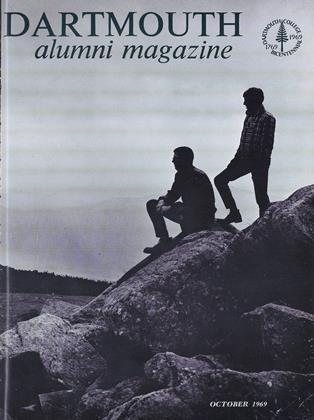By Ken Wlaschin '56. London: WolfePublishing Ltd., 1969. 64 pp. Five shillings.
As the Programme Director of the National Film Institute of Great Britain, a division of the British Film Institute (somewhat like the Museum of Modern Art in New York), Mr. Wlaschin has a serious and professional interest in the cinema. This is not to say that he cannot be frivolously witty about his profession. Instant erudition enables a reader to jazz up his jargon and to win at oneupmanship in any company. Samples: "Never admit ignorance of a film, a director of a cult. Merely despise them." "Bad films can even be liked for being bad or 'enormous fun,' according to High Camp faddists." "A real cultist will often prefer the lousy films of his favorite director to the good ones, because they give the director's idiosyncrasies more chance to shine." "... the bluffer ... does not want to get snowed under by fact. What he wants to know is who is 'in' and who is 'out' and what names he should drop."
Mr. Wlaschin asserts that cinema is the trendy art form of the 1960's and that fashionable arts like the theatre and opera are now derriere garde. If you cannot bluff knowledgeably about films, you're nowhere socially.
With Mr. Wlaschin you're in. He gives you the nifty epigram, the fuzzy profundity, to the mauvais mot to silence opponents, the empty wisecrack, the shocking paradox to make you the authority anywhere at any time. You can't miss. The 15 directors for serious films, the 20 for commercial, the 13 for B pictures, and the 15 new directors are there for you to pronounce on as you oscarwilde your way into the brilliant sunflower inner circles of frauds and imposters.
Do you know who has the most modish name in underground circles? Stan Brakhage '55. He is the Dartmouth dropout who lasted only six months in Hanover. The reason for his present acclaim is that he turned his back on surrealism and experiment and turned to "personal filmmaking, the most important movement of the late 50's and early 60's." Mr. Wlaschin asserts that Brakhage is personal because most of his films are about his own life or poetic versions of it. In Window Water Baby Moving (1959), Brakhage was pleased to present the graphic portrayal of the birth of his own baby, and it includes a shot of himself taken minutes after the birth by his wife. This, according to Mr. Wlaschin, is real devotion.
 View Full Issue
View Full Issue
More From This Issue
-
 Feature
FeatureThird Century Fund Launches General Campaign Among Alumni
October 1969 -
 Feature
FeatureThe Transcending Great Issues
October 1969 -
 Feature
FeatureA Scientific Centennial for Dartmouth
October 1969 By ALLEN L. KING -
 Feature
FeatureWhitewater Racing Gains New Status
October 1969 By JAY EVANS '49 -
 Feature
FeatureBicentennial Draws Unusual Gifts
October 1969 -
 Article
ArticleWith the Big Green Teams
October 1969
JOHN HURD '21
-
 Books
BooksBOSWELL IN SEARCH OF A WIFE, 1766-1769. Edited
January 1957 By JOHN HURD '21 -
 Books
BooksSEVENTY NEW POEMS.
JANUARY 1969 By JOHN HURD '21 -
 Books
BooksP AS IN POLICE.
JANUARY 1971 By JOHN HURD '21 -
 Books
BooksBriefly Noted
MARCH 1971 By JOHN HURD '21 -
 Books
BooksYOUR JOB: TO HAVE AND TO HOLD.
NOVEMBER 1971 By JOHN HURD '21 -
 Books
BooksNEW JERSEY HISTORICAL PROFILES REVOLUTIONARY TIMES.
April 1974 By JOHN HURD '21
Books
-
 Books
BooksTHE PROBLEMS OF ADMISSION TO COLLEGE
June 1929 -
 Books
BooksYANKEE DICTIONARY.
OCTOBER 1963 By C.E.W. -
 Books
BooksA Differentiation of Tongues
APRIL 1978 By GEO. WINCHESTER STONE JR. '30 -
 Books
BooksA DARTMOUTH READER.
MARCH 1970 By HERBERT W. HILL, A.M. '41 -
 Books
BooksThe Birth of a Nation
APRIL 1984 By Jean Kemeny '53ad. -
 Books
BooksGREEK PLAYS IN MODERN TRANSLATION,
December 1947 By ROYAL CASE NEMIAH.

